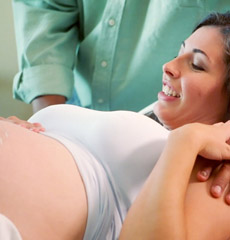fitness news
![]() ,
,![]()
Font size Fertility & Pregnancy
Dying During Delivery – Heart Failure Kills Moms-To-Be
– Reported, February 14, 2012
 CINCINNATI, Ohio, (Ivanhoe Newswire) –Finding out youre pregnant can be one of the most joyous times of a couples life, but a potentially devastating disease affecting young, healthy women could take that all away. Well show you what expectant mothers need to watch out for.
CINCINNATI, Ohio, (Ivanhoe Newswire) –Finding out youre pregnant can be one of the most joyous times of a couples life, but a potentially devastating disease affecting young, healthy women could take that all away. Well show you what expectant mothers need to watch out for.
Its the call Dr. Stephanie Dunlap never wants to get.
Its always my most anxious moment as a heart failure physician…because I have the chance to lose two patients instead of one,” Dr. Stephanie Dunlap, Medical Director at the Heart Failure Program at the University of Cincinnati told Ivanhoe.
The moment that almost took Amanda Hodges life at 28 and pregnant with her second child, something didnt feel right. But .
Doctor after doctor kept saying, youre pregnant honey, youre going to have swelling youre going to have trouble breathing, you do get tired easy,’ Amanda Hodge, a woman who suffered heart failure at 28 told Ivanhoe.
At 24 weeks, her water broke. She was put on bed rest, and then three weeks later she underwent an emergency C-section, when her heart suddenly stopped beating. The cause? Peripartum cardiomyopathy, which is a form of heart failure that affects healthy women during the last months of pregnancy or up to five months after delivery. It happens in about one in every 3,500 pregnancies and 25 to 50 percent of affected women will die. Since the symptoms mimic pregnancy, its often not diagnosed. But watch out if:
You develop ankle swelling to the point you can stick your thumb in and leave a dimple thats two millimeters or more deep and you hear yourself wheezing and youre having to sit up at night to breathe, Dr. Dunlap said.
While Amandas life was saved, baby Gideon Lew didnt make it. Now Amanda wants to warn others about the condition.
The fact that Im here at all is an absolute miracle and I wont take that for granted, Amanda concluded.
Women who develop Peripartum Cardiomyopathy run a high risk of death with future pregnancies and doctors warn against trying to get pregnant again.
FOR MORE INFORMATION, CONTACT:
Katie Pence
Public Information Officer
University of Cincinnati Academic Health Center
(513)558-4561
[email protected]